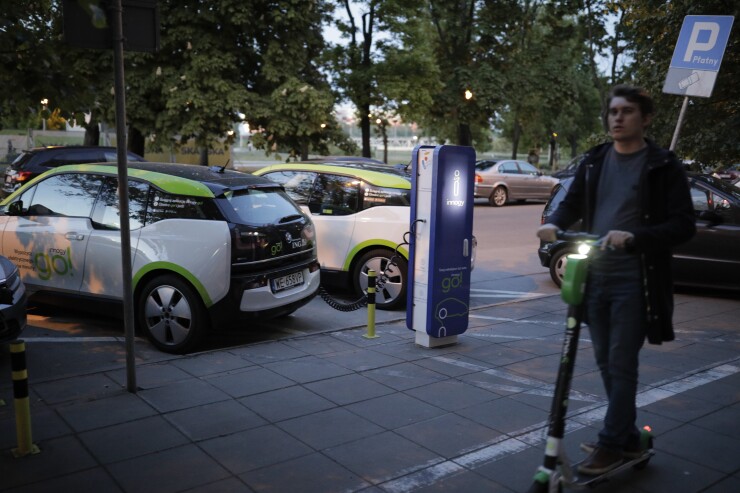The number of states levying special annual registration fees on electric vehicles has risen by seven this year to 27 as governments seek new ways to fund transportation.
Typically the special registration fees are part of a larger package of infrastructure financing legislation that may including bonding for major projects.

Four of the states adopting the new fees this year — Alabama, Arkansas, Illinois and Ohio — are doing it in conjunction with state legislation to increase gasoline taxes.
The other three imposing a new registration fee are Iowa, Kansas, and North Dakota.
An eighth state that already imposed a fee, Wyoming, raised it this year.
Fourteen of these 27 states also impose
For instance, the new registration fees in Arkansas and Alabama are $200 for electric vehicles and $100 for hybrids. West Virginia adopted the same fee structure in 2017.
These special registration fees for electric vehicles or EVs, as they are often called, are mostly between $100 and $200.
They range from as low as $50 in Colorado to $1,000 in Missouri for large trucks weighing more than 36,000 pounds. Missouri’s fee for EV passenger cars is $75.
The revenue represents only a small fraction of transportation budgets, but the fees are part of a larger effort to address evolving changes in the transportation system as passenger vehicles become more fuel efficient and a growing number are all-electric.
“This is not a big money generator,” said Carolyn Kramer, director of the Transportation Investment Advocacy Center of the American Road and Transportation Builders Association (ARTBA).
Iowa only had around 800 EVs registered in the state as of September 2018.
Iowa’s new fee, which eventually be $130 annually, is estimated to generate $647,000 in fiscal 2022 but it is expected to almost double to about $1.2 million by 2024.
“I don’t think it’s about the current revenue,” Kramer said. “I think it’s anticipating that this fleet is going to grow in the future. I think it’s also an equity issue that those people who are driving electric vehicles but not paying their share of the gas tax are still contributing for the maintenance and repair of roads and bridges.”
EVs are part of a broader category of alternative-fuel electric cars and trucks that includes hybrids, and vehicles that run on propane, fuel cells and natural gas.
The number of alternative-fuel cars and light trucks is expected to grow to to 29.3 million vehicles in 2021, or about 12% of the nation’s vehicle stock, from 21.5 million vehicles in 2016 which was 9% of the fleet, according to the U.S. Energy Information Administration.
As recently as 2016 only 10 states imposed higher registration fees on electric vehicles.
John Hicks, executive director of the National Association of State Budget Officers, expects most states to enact special registration fees for EVs in the coming years under the principle that roads and bridges should be financed as a user-based public good.
“States have made an effort of converting what is a forgone revenue of an electric vehicle in their state,” Hicks said. “They’ve done some calculations, but they’ve come up with some pretty round numbers here. The idea here is to apply the same use principle for electric vehicles as there is to gas-powered cars.”
Hicks said more states also are dedicating the sales tax revenue from new car and truck sales into their transportation accounts rather than into their general fund, with Connecticut the latest to do that.
A few states are experimenting with excise taxes on vehicle miles traveled. Utah is even giving EV owners the choice of paying either a higher annual registration fee or a road usage charge beginning in January 2020.
Oregon was the leader in experimenting with so-called road usage charges and is the only state that is actually collecting them.
Thirteen other states have joined with Oregon to form what is called
Among the RUC West members, California, Colorado, Hawaii, Washington and Utah are already experimenting with road usage charges.

“By 2030, as much as half of the revenue that could be collected from the gas tax will be lost to fuel efficiency,” RUC West says on its website. “States need to explore more sustainable transportation funding models, like RUC, in order to generate adequate revenue to support their road maintenance and improvement needs.”
Susan Howard, program director for transportation finance at the American Association of State Highway and Transportation Officials, said there may be a nationwide pilot project for using road usage charges included in the next federal reauthorization of the Highway Trust Fund.
House Transportation and Infrastructure Committee Chairman Peter DeFazio, D-Ore., has expressed interest in that.
“I think Congress will address it in some way,” Howard said. “We’re not ready to go full throttle yet.”





